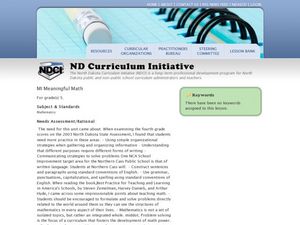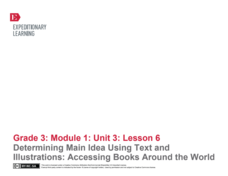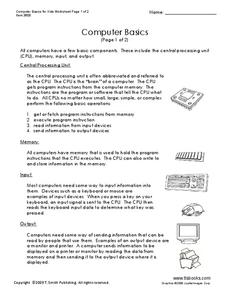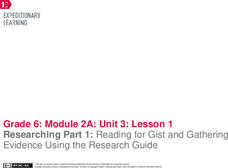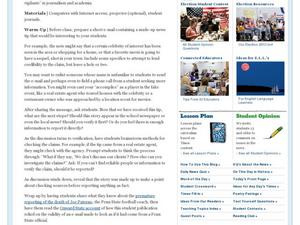Curated OER
MI Meaningful Math
Fifth graders increase skills in organizing information for writing. In this organization lesson, 5th graders use correct grammar to design math problems for real world math.
Curated OER
Students Information And Interest Survey
In this personal information worksheet, students fill out this form to give details about their personal history, prior experiences and preferences. This could be used for information gathering or as an icebreaker activity.
Curated OER
Graphing : research and record information
First graders create graphs. In this graphing lesson, 1st graders create a floor graph using their bodies to record information. They create picture graphs after collecting information.
Curated OER
Lesson 1: Explicit Information versus drawing conclusions
Second graders look at the difference between explicit information and drawing conclusions. In this drawing conclusions lesson plan, 2nd graders read a passage and find areas where information is given and others where they have to think...
Curated OER
BOOK REPORT: INFORMATIONAL BOOKS
In this book report form for expository reading, students are given four questions to answer about their book. Questions include, "Did you find the book interesting?" and "What type of information is this book about?".
Curated OER
Sources of Information
In this sources of information worksheet, young scholars respond to 7 fill in the blank questions regarding primary and secondary sources.
Curated OER
Organizing Information into an Outline
Students explore outlines. In this nonfiction comprehension and study skills lesson, students complete a traditional outline for the book Animal Homes by Ann O. Squire following guided instruction as the teacher models gathering...
Curated OER
Explicit Information versus Drawing Conclusions
Fourth graders read a comprehension passage and answer short answer questions and then identify their answers as explicit information or drawing conclusions. For this comprehension lesson plan, 4th graders do this as a whole and...
Teach-nology
Author’s Purpose
What is the author's purpose in writing a joke book? What about a book about the digestive system? Explore author's purpose with a instructional activity that challenges kids to identify whether ten books are meant to entertain, inform,...
Curated OER
How to Locate and Evaluate Information, Part I - Online Catalog
Using the online catalog, researchers locate and record on a citation template specific sources for their research paper. A library specialist models searching strategies while the teacher introduces the research paper process. Daily...
Lakeshorelearning
Read and Write about It
Reading informational text is a skill that transcends subjects and grade levels. Practice reading about different topics in various formats with a language arts lesson that includes opportunities for writing and research as well.
Channel Islands Film
The Legendary King
After viewing two documentaries about the history of the Channel islands, individuals craft an essay in which they compare the lives of Juana Maria, the Lone Woman San Nicolar Island, to Lester Holt and his family featured in the...
EngageNY
Determining Main Idea Using Text and Illustrations: Accessing Books Around the World
Ease into informational text with the lesson suggested here. Part of a unit series, the lesson draws from previous lessons and acts as a natural moment to add in informational text. Class members read one section of My Librarian is a...
T. Smith Publishing
Computer Basics for Kids Worksheet
This informational reading activity can be used in your literacy or computer class. Students learn the basic components of computers then test their knowledge with multiple choice and fill-in-the-blank questions.
Southern Poverty Law Center
Choosing Reliable Sources
It is more important than ever that 21st-century learners develop the skills they need to become savvy consumers of media. Young learners locate and identify reliable sources of information with a helpful media lesson plan.
EngageNY
Paragraph Writing: The Role of Religion in Colonial America
Informative writing is emphasized in the standards. Help your learners reach that goal with the plan for paragraph writing outlined here. After reviewing the work from the day before and adding to their vocabulary notebooks, class...
Nancy Fetzer's Literacy Connections
Expository Paragraph
Upper elementary and middle school writers learn how to craft an expository paragraph by following the six steps detailed in a 48-page instructional guide. Learners learn how to write six different types of informational paragraphs: to...
Teach Engineering
Searching for Bigfoot and Others Like Him
Individuals create a GIS data layer in Google Earth that displays information about where one might find seven different cryptids. The class members research to find data on cryptid sightings they can include in their data layer.
EngageNY
Researching Part 1: Reading for Gist and Gathering Evidence Using the Research Guide
If only life came with an owner's manual. Pupils assemble with their research teams to discuss which of Steve Jobs' rules to live by most resonates with them. Scholars also read informational texts in pursuit of finding the gist and...
EngageNY
End of Unit 1 Assessment: Inferring and Synthesizing (From Two Texts) About Life in Colonial America
Close your colonial America unit with a performance-based assessment. Class members will show their proficiency in several skills including using details to back up inferences, determining the meaning of words in context,...
EngageNY
On-Demand End of Unit Assessment and Bookmark Celebration
Using everything they have learned about writing paragraphs over the past few lessons of the unit, class members compose an informative paragraph independently. This is an authentic assessment of their ability, since learners have...
California Education Partners
Follow the Water by Arthur Dorros
Assess scholars' reading and writing capabilities with an exam that challenges learners to respond to an informative text. Through note-taking and peer discussion, pupils analyze a passage from the story, Follow the Water from Brook to...
EngageNY
Researching about the Red Cross, Continued: Who Is the Red Cross and What Does This Multinational Organization Do?
Code red! Learners read an informational article about the Red Cross, discussing the gist of the text in small groups. On a three-column note catcher, pupils take notes to show how the Red Cross functions as a multinational aid...
Curated OER
Check It Out: Verifying Information and Sources in News Coverage
If it’s in the news it must be true, right? Prompted by a New York Times article, class members consider the importance of accuracy in reporting and validating sources. The detailed plan includes warm-up exercises, discussion questions,...
Other popular searches
- Informational Text
- Informational Writing
- Geographic Information Systems
- Informal Letter
- Student Information Systems
- Informal Letter Writing
- Informational Text Features
- Informative Writing
- Information Media & Technology
- Informational Text Passages
- Locating Information
- +Student Information Systems


